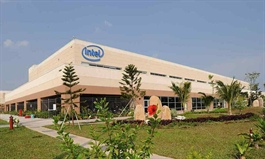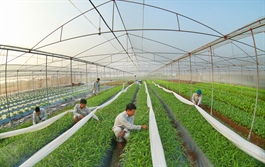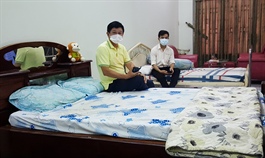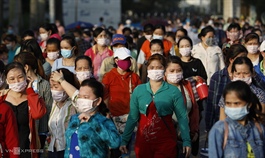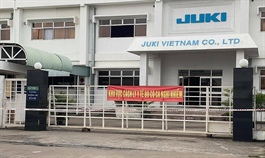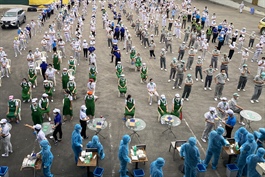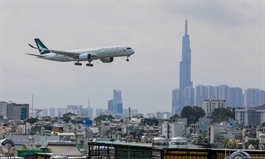Businesses strive to maintain production amid lockdown in HCM City
Businesses strive to maintain production amid lockdown in HCM City
When HCM City went into lockdown under Government Directive 16 on July 9, many businesses and manufacturers prepared plans to set up temporary accommodations for their workers to avoid the spread of coronavirus and maintain production. 
Hoang Minh Anh Tu, general director of the Alta Group, told Tuoi Tre (Youth) newspaper that the business rearranged the factory’s premises in order to set up about 100 tents.
Besides preparing meals, the company also has separate living quarters for male and female employees. Male workers sleep in tents, while female workers stay in the office block and sleep in bunk beds.
COVID-19 tests are offered regularly to delivery workers and periodically to workers staying at the company.
The company has also set up a temporary isolation area for F0 (infected cases) and F1 cases (direct contacts of F0s) before they are taken to concentrated isolation areas by a medical task force.
Many businesses at Saigon Hi-Tech Park have prepared plans to maintain production by renting hotel rooms for employees to stay.
Nidec, for instance, encourages its workers, including those from Dong Nai and Binh Duong provinces where COVID-19 cases have been reported, to stay at a hotel near the company to avoid interruptions in production, according to Luu Kim Hong, chairman of the trade union at Nidec Vietnam Co. Ltd.
The deputy head of the Saigon Hi-Tech Park management board, Le Thi Bich Loan, said that FDI enterprises such as Intel, Schneider, and others have also rented hotel rooms near the park to provide temporary accommodation for workers.
However, factories in the Hi-Tech Park should first send detailed plans to the board of management for evaluation and appraisal before they renting rooms, he said.
According to the HCM City Export Processing and Industrial Zones Authority (HEPZA), nearly 100 enterprises have registered plans to keep production going.
HEPZA said that temporary housing was the best choice for small businesses with only a few hundred workers, but large-scale enterprises with up to tens of thousands of people should research better options.
Many businesses have had difficulties offering workers temporary housing due to female workers' personal hygiene needs, a representative of an FDI enterprise in Saigon Hi-Tech Park said.
Moreover, some company premises are not large enough to set up temporary accommodations and ensure a safe distance between employees.
The Juki Vietnam Co., Ltd. in the Tan Thuan Export Processing Zone in District 7 is an example. Company director Dao Quoc Cuong said: "Based on the company’s current facilities, only 35 per cent of workers can stay at the company. Living expenses for workers can be solved, but reducing production by 50 to 100 per cent will cause the company to suffer serious losses and lose customers."
The head of the Business Association of Saigon Hi-Tech Park, Ho Uyen, said that in order to minimise cross-contamination at factories, businesses should send some workers back to their hometown and increase the frequency of testing.
The regulation requiring testing every three days is another difficulty for small-scale enterprises.
Tran Viet Anh, general director of Nam Thai Son Import-Export Joint Stock Company, said that workers should be tested once a week instead of every three days because it takes time to get COVID-19 test results, which increases the risk of infection.
HCM City has 1.6 million workers at industrial parks and export processing zones.








